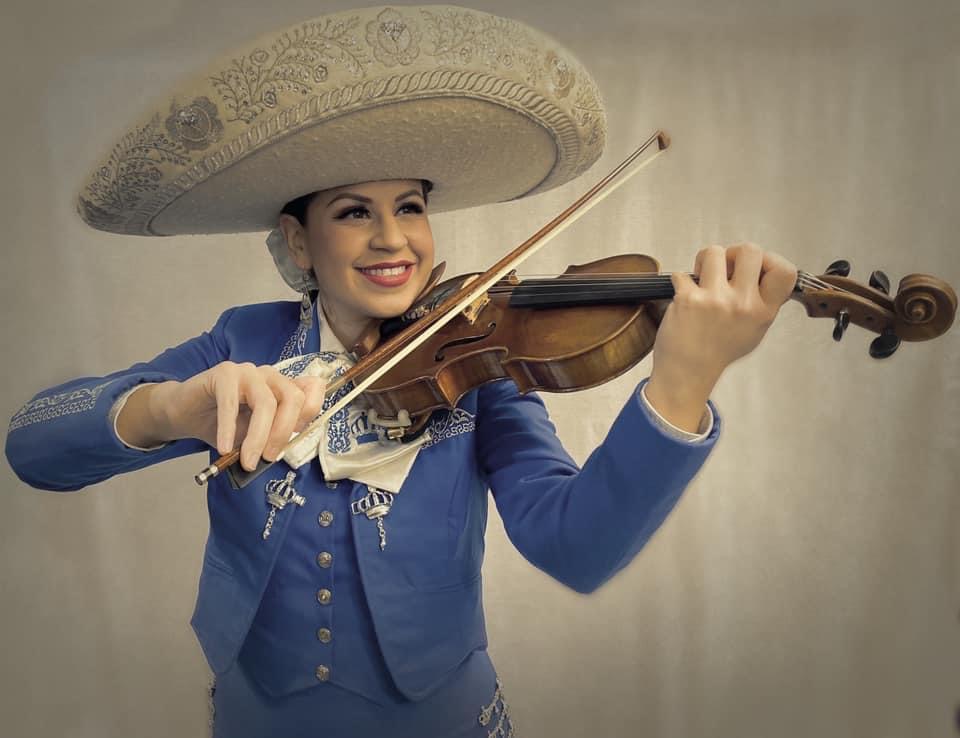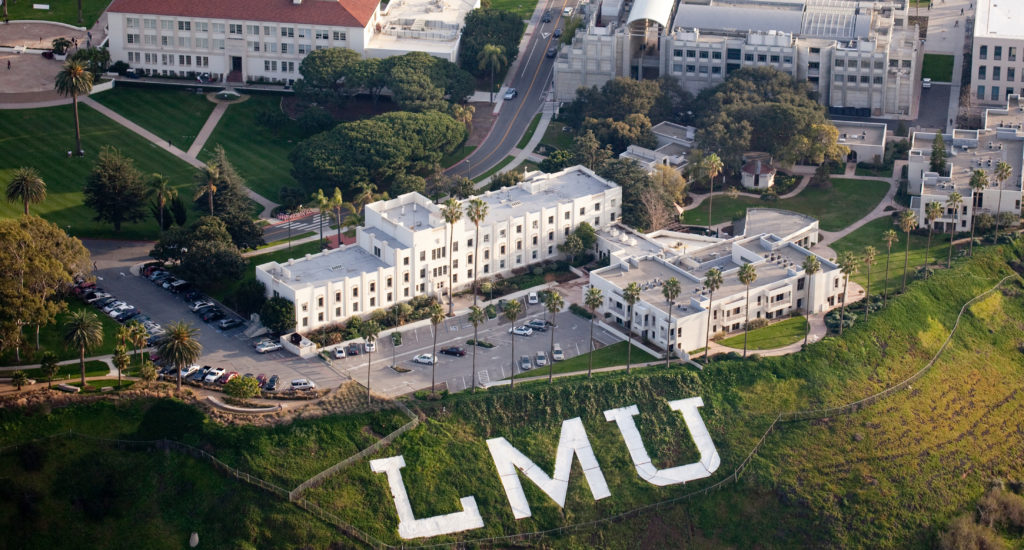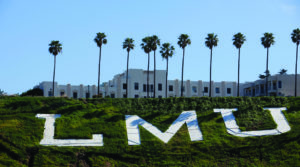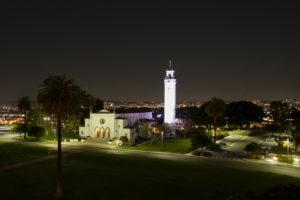By Ernesto Colín
Associate Professor, School of Education
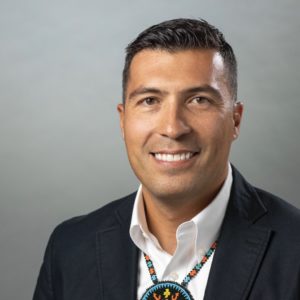
In many ways, Latinx Heritage Month invites us to look back. The month prompts us to consider harvests, transitions, pathways, and ancestries. We contemplate the people who have come before and formative experiences we carry. I am attracted to an indigenous worldview which uses the metaphor of a road for life. As we walk, our lives might acknowledge and honor the people who paved the road, the individuals who have swept the road to clear obstacles, those who light the path, those who feed our soul, and those who walk at our side.
As LMU community members, part of our travel takes place in the mutuality, network, experiences, and values of university spaces. LMU is made better by our contributions and we move from here with all the experiences provided. At the close of Latinx Heritage month we feature three alumni who represent the best of us, whose admirable accomplishments stand in representation of a vast array of alumni legacies. They were each asked to share reflections on their time at LMU, their professional pathways, and how they carry their Latinx and LMU heritages with them. The following are highlights from
our conversation.
Romina Huerta
Romina Huerta is a member of the LMU Class of 2012 who majored in communication studies and music performance. Among other things, she served as the president of Marians and worked at the Downtown Women’s Center. She later completed a year of post-grad service through City Year in the field of education. Inspired, she went to pursue a graduate degree in speech pathology and to a position as a speech language pathologist at Casa Colina Hospital in Pomona, California. Romina works as a bilingual speech pathologist, in a field who that suffers a severe shortage. Daily, she sees how the language skills, cultural understandings, and personal ethic she carries make her a more effective practitioner. Her work environment evokes an LMU ethos. “The LMU mission resonates here [at the hospital]. Dignity. Respect. Diversity. No one is turned away and the environment is very collaborative. Doctors. Patients. Specialists.” She adds, “LMU shaped me. My time in service taught me compassion. I learned not to be judgmental, that anyone can end up in a tough situation, and that we have to understand where people are coming from. I chose this profession because it is an important service role. It feels so nice to help others.”
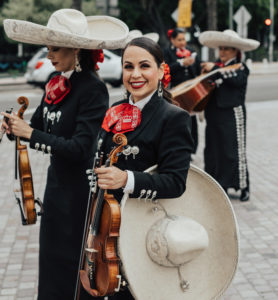
Romina Huerta has another full-time job. She is a violinist and vocalist for Mariachi Reyna de los Angeles, an award-winning group founded in 1994 and the first all-female mariachi show band in the United States. The group performs across the country, from the White House to Dodger Stadium, where I caught up with her performing in front of 50,000 fans on Fernando Valenzuela bobble-head/Mexican Heritage night. “I eat, breathe, and sleep Mexican culture! I am in so many venues across the country. I love celebrating, representing and sharing our culture with so many people.” Romina grew up in the San Fernando Valley and began playing at age 9. She joined the music programs at her elementary and middle schools as well as the National Endowment for the Humanities-funded Mariachi Master-Apprentice program. She has performed professionally since age 15, and continued working through her LMU years, where she also played in Sunday liturgies in Sacred Heart Chapel. She joined an L.A. institution band, Las Colibrí, and her success there led to an invitation to join Mariachi Reyna de los Angeles, directed by José Hernández. Romina underscored she is proud to carve out a women’s space in a male-dominated arena and she recently recorded a new album with the band, “¡Qué vivan las mujeres!”, which is being considered for a Grammy Award. “I felt at home at LMU. I didn’t have to hide who I was. I am both American and Mexican. I felt accepted.” Whether in service, music, academics, or therapy, Romina brings her full, authentic self to the work.
Marisol León
Marisol León is an LMU alumna and a civil rights attorney with the California Department of Justice where she received the 2018 and 2020 Attorney General Award, which recognizes CADOJ employees who have demonstrated the highest professional work standards. Earlier this year, she also received the Hispanic National Bar Association’s 2021 Top Lawyers Under 40 Award and the American Bar Association’s 2021 On the Rise-Top 40 Young Lawyers Award. Marisol is also an adjunct professor at Occidental College teaching courses about social movements and the law. The sources of her critical consciousness and social justice advocacy lie in family legacy, community partnership, and academic enterprises.
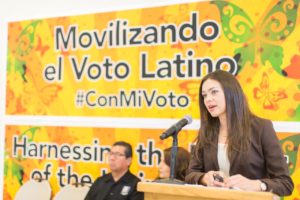
Both of Marisol’s parents were born and raised in rural farming communities in Mexico. Her family was part of the Bracero guest worker program and her father came to Los Angeles and worked as a cafeteria worker for 48 years. Growing up in Mid-City L.A., she attended LAUSD schools until a program called A Better Chance helped her and her sister apply and secure full funding to attend a private, independent high school in Santa Monica.
Marisol attended Yale University on a full scholarship, convinced she wanted to become a journalist and write about Latin American social movements, particularly because of her family’s background. She went on to research Brazil’s Landless Rural Workers Movement (Movimento Sem Terra or MST) and at the MST’s National School, she decided become an educator. Students at the National School spend time in classes, return to their communities to apply lessons, and later go back to the academy to share their experiences. It is a model of co-creating with the community, peers, and teachers. During her time in Brazilian schools, she contemplated a return to her middle school to apply all she had learned in the MST model. Before pursuing a public teaching job in the U.S., she moved to San Cristobal de Las Casas in the state of Chiapas, where she worked with Friends of the Earth-Mexico. The organization organizes with various social movements against mega-development projects that displace rural communities and undermine indigenous autonomy. “The six months I spent in Brazil studying the MST and the year I spent learning what popular education looks like in practice in Chiapas, Mexico, were the most formative periods of my life; they helped define what values would guide me moving forward. I returned to the States and enrolled in LMU’s School of Education Urban Education Program through which I obtained my teaching credential and master’s degree, all the while working at my [public] middle school.”
Marisol went on to teach at her high school and became involved in a lawsuit involving teacher layoffs. “Being part of the successful lawsuit that protected my middle school as well as other LAUSD schools from future layoffs, is what inspired me to pursue a legal education and become a civil rights attorney … I love that I get to fight with and for some of the most vulnerable members of our community, and that I always have a deep personal connection to my work. . . I loved teaching middle school and high school and really missed the classroom during the first three years I practiced. I feel very blessed I now get to do both [practice law and teach]. Working with undergrads who are committed to social justice work and are interested in the law has been a real gift.”
“I carry my family in everything I do. As a civil rights attorney working on immigrants’ rights, I think about my parents who came to this country undocumented; I think about family members who have been in immigration detention and/or defrauded by notarios; I think about my large mixed-status, extended family. When I work on matters related to workers’ rights, I think about my father – as well as family members working in the fields of the Central Valley or in factories in L.A. – being treated as expendable and not always getting their meal and rest breaks. When I work on education-related matters, I think about my current and former students. When I work on police practices, I think about growing up in a community that went up in flames during the 1992 riots and how that served as an initial catalyst for police reform and accountability. The fact that I am bilingual, that I grew up in a working-class Black and Latinx neighborhood, that my parents are immigrants – all of these things that define who I am, have allowed me to travel throughout the state and build rapport with members of communities similarly situated … I also carry LMU. I am consistently motivated by what I learned from my SOE professors and classmates, not just about best practices, but also about the importance of taking care of ourselves as educators so we can better serve our students and our communities.”
Tony Alonso
Tony Alonso is a Latin Grammy-nominated composer of sacred music and assistant professor of theology and culture at Candler School of Theology at Emory University.
Tony identifies as a Cuban-American Roman Catholic and composes to embrace multicultural musical expressions. In 2015, Tony’s compositional work was recognized with an invitation to compose the responsorial psalm for the first Mass Pope Francis celebrated in the United States. In 2020, he was nominated for a Latin Grammy for his groundbreaking album “Caminemos con Jesús.” He holds a Bachelor of Music in choral conducting from Northwestern University, a Master of Arts in theology from LMU, and a Ph.D. in religion from Emory University. Tony Alonso also worked as the director of liturgical music for Campus Ministry
at LMU.
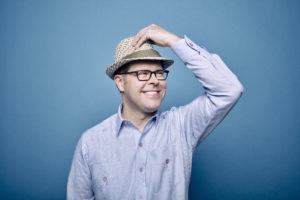
Tony’s scholarship and musical work reflect his familial traditions and experiences rooted in Minnesota, California, Cuba, and beyond. “I believe music is one of the most theologically formative liturgical expressions, I wanted to be sure the music I was writing was not only musically grounded, but theologically grounded as well. That’s what initially led me to pursue the M.A. at LMU. But my study at LMU ultimately opened up a whole world of questions I never anticipated. It was those questions that then led me to pursue a Ph.D.” An opportunity to join the faculty at Emory university emerged and he has been there ever since.
Tony’s heritage is a wellspring of inspiration. “My Cuban grandparents were always the deepest anchors to the Cuban side of my identity. When they died, I felt a deep call to keep alive the Cuban traditions, recipes, and music in new ways. I began to learn all of my abuela’s recipes, to reflect more deeply on all the things about my Latinidad I once took for granted, and to think about how I wanted to express that part of my identity in my theology and my music. It finds expression in my theological writing through the sources of my theological reflection, which are often fragments of lo cotidiano of my own life. It found expression in my music most recently in an album called “Caminemos con Jesús” – a musical tribute to my Cuban heritage. But at the end of the day, I don’t see the theological and the musical as separate realities, but as different aspects of a single one reality.” https://youtu.be/-qsmN_SmBTo.
Tony is an intersectional artist and scholar who looks to build bridges in community. “In many ways, my time in Los Angeles prepared me well for what I do now … The other thing I love about my work is the opportunity to work ecumenically. The opportunity to work across difference has been such a blessing to me. It’s made me a better scholar and a better human.”
DEI Buzz
- Celebrate Latina/o/x Heritage Month with LMU. Visit the hub.
- Save the Date for “Who was Rev. Junipero Serra?: Reconciling Past with Present” event on Nov 4th, 4:30-6 p.m.,
location TBD - Inclusive Excellence Grants Call for Proposals (due 11/15)
- Systemic Analysis Year 2 initiatives are in place.
We invite you to attend a Systemic Analysis Report Out Session. Units can share their progress and receive feedback from the community. Seaver College will present on October 19. Register here. - Register to attend one of three types of workshops offered this year:
Classic Consultation Workshops for Unit Reflection
Capacity and Community Building Workshops
Faculty Workshops with the Center for Teaching Excellence - Check out DEI’s Fall 2021 calendar.
